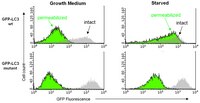17-10230 Sigma-AldrichLentiBrite™ GFP-LC3-II Enrichment Kit (Flow Cytometry)
Recommended Products
-

106579 Supelco di-Sodium hidrogen fosfat dodekahidrat -

71127 Sigma-Aldrich Nus•Tag™ Monoclonal Antibody -

69431 Sigma-Aldrich pET-9a DNA - Novagen -

MABD168 Sigma-Aldrich Anti-WNT1 Antibody, clone 10C8 -

814353 Sigma-Aldrich Potassium hydroxide (powder) -

172580 SAFC Kalsium klorida dihidrat -

FTPF11487 Milli-Q FTPF11487 -

14-840 Sigma-Aldrich AMPK (α1, β1, γ1) Protein, active, 10 µg -

574778 Sigma-Aldrich Anti-Synapsin I Rabbit pAb -

MAB19310-C Sigma-Aldrich Anti-Aggrecan Antibody, MMP Cleaved, clone AF-28, Ascites Free
Overview
| Product Information | |
|---|---|
| Components |
|
| Detection method | Fluorescent |
| Quality Level | MQ100 |
| Product Usage Statements | |
|---|---|
| Usage Statement |
|
| Packaging Information | |
|---|---|
| Material Size | Minimum of 3 x 10E8 infectious units (IFU) per mL |
| Global Trade Item Number | |
|---|---|
| Catalogue Number | GTIN |
| 17-10230 | 04053252008795 |







